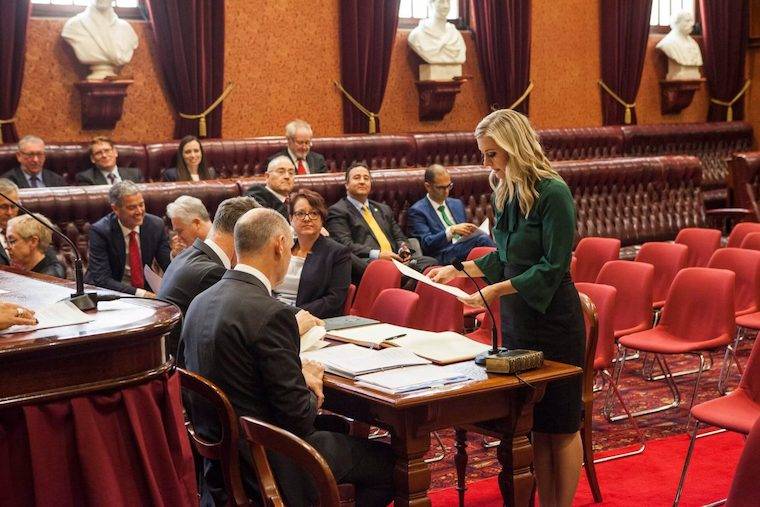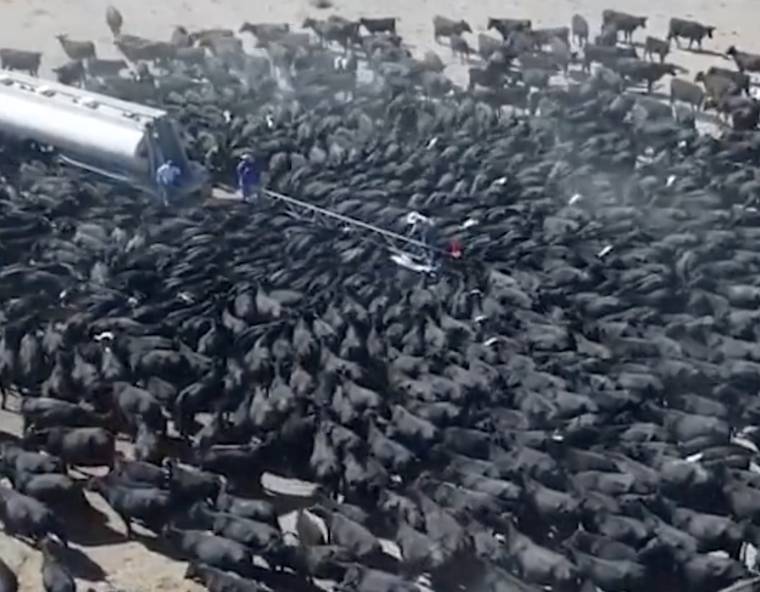Australia Swears in Third Vegan Activist to State Parliament
An Animal Rights Article from All-Creatures.org
FROM Matthew Zampa,
SentientMedia.org
May 2019
Emma Hurst, an outspoken vegan activist and representative of the Animal Justice Party (AJP), was sworn into Australia’s New South Wales State Parliament, making her the second vegan activist elected to office in the past two years and the third since 2015.

NSW Parliament
Australians will return to the polls this Saturday in what’s becoming a
pivotal election for animals and the environment. The big question: Will
Australia’s next prime minister be friend or foe to the nation’s $30 billion
animal agriculture industry?
Just one month after the prime minister of the third fastest growing vegan
economy in the world called a nonviolent vegan protest “un-Australian,” Emma
Hurst, an outspoken vegan activist and representative of the Animal Justice
Party (AJP), was sworn into Australia’s New South Wales State Parliament,
making her the second vegan activist elected to office in the past two years
and the third since 2015.
Veganism is gaining momentum in all facets of life in Australia. The
plant-based food industry there is exploding, forecasted to grow 58% by
2020. Nationwide, there are reportedly more than 2 million vegans. Veganism
is especially popular among the country’s youngest voters. According to a
recent survey conducted by a vegan food company, 44 percent of young people
(aged 18–24) think that veganism is “cooler than smoking.” Another poll
found that when asked the question, would you give up meat if it meant
saving the climate, one in five young people said yes.
Vegans are not only starting to make the switch younger in Australia but for
the right reasons–because they care about animals and the environment.
Still, what’s true for millions of vegans is not true for the nation’s
farmers, who are well represented by Australia’s current crop of Senators.
As far as Prime Minister Scott Morrison and Parliament’s pro-farming
majority are concerned, animals are no more than the means to a very
profitable end for this Parliament.
Fighting for a more vegan Australia
According to Animal Clock, 1.8 billion animals have been killed for food in
Australia so far this year–and counting. The animal agriculture industry in
Australia, including the beef cattle, dairy, sheep, pig, and poultry
industries, account for about half ($30 billion) of the gross value of
Australian agriculture as a whole. About 70% of this value comes from
slaughtered animals, the other 30% from milk, wool, and eggs.
Live animal export is also one of Australia’s largest industries. In 2018,
the country exported 2.85 million living animals in cramped, cruel shipping
containers. That same year, 2,400 Australian sheep died of heat stress en
route from Perth to the Middle East and millions more suffered on the way to
certain death.
These numbers are not to be taken lightly–by anyone, elected official or
otherwise–and animal activists have certainly made noise about animal
cruelty in Australia over the past few months. In early April, hundreds of
animal rights activists blocked traffic in the middle of downtown Melbourne
during the city’s busiest hours, part of a wave of action in three states,
while others targeted abattoirs in the middle of the night to protest
cruelty to animals on factory farms.
Australian police arrested 40 vegan activists during the protest.
Morrison called the protests “un-Australian” and declared his unrelenting
support of the country’s farmers, who he deems are under attack. “The
commonwealth is open to supporting them to show these green-collared
criminals that you don’t get to go and pull the rug from under our Aussie
farmers,” said Morrison. He is up for re-election this Saturday, May 18.
Pivotal election for animals and the environment
This year’s election is being called the “Climate Election.” According to a
recent Lowy poll, Australians overwhelmingly agree climate emergency is the
nation’s number one threat. In a list of 12 threats to Australia’s national
interests, two-thirds (64%) of Australians put climate change at the
top—ahead of cyber attacks, terrorism, and North Korea’s nuclear program.
“In Australia, the animal agriculture industry accounts for around 11
percent of national emissions (carbon equivalent) when projecting the
impacts over a 100-year timescale,” AJP member Michael Dello-Iacovo wrote in
a recently published article about reducing carbon emissions through
veganism. “However, when using a 20-year timescale, it accounts for 50
percent. This is because methane, while shorter-lived in the atmosphere, has
a much stronger climate forcing effect. The proportion of methane in animal
agriculture is much greater than in industries such as energy and transport,
the amount of warming it will create over the next twenty years is
significantly higher.”
According to the AJP, the Australian government is fully aware of the
disastrous impacts of climate change across Australia and as it stands,
elected officials are unwilling to adapt their policies to help soften the
blow. Nearly 85 percent of the population that lives along the coast will be
impacted by rising seas, storm surges, flooding, heatwaves, and damage to
public infrastructure. Continuing to rely on animal agriculture will only
accelerate these potentially deadly consequences.
“A science-based [climate change] policy considers the impacts of various
activities and sets policies accordingly. It doesn’t prioritize a cattle and
BBQ culture ahead of a livable climate.”
“Our agricultural yields will be diminished by natural disasters and
sustained drought conditions, putting our food security at risk. Water will
become more scarce and fresh-water aquifers will become contaminated by
seawater. These issues will create social and political problems for future
governments as our population struggles to adapt to an unforgiving and
unpredictable climate,” the AJP writes on its website.
It’s also important to remember that all of these problems that “we” will
face in the near future, animals will face too. During a drought last year
in Western Australia, where temperatures reached 117 degrees Fahrenheit,
farmers could barely afford to feed their cattle at $10,000 per truckload of
hay. With all their natural food and water sources disappearing under the
brutally hot sun, the animals became completely reliant on their farmers—who
drove around water trucks to keep them alive.

At 104 degrees Fahrenheit, which was on the low end of the extreme
temperatures recorded during Australia’s third-hottest year on record in
2018, many of the country’s native species can no longer survive. During one
heat wave, piles of dead fox bats, whose brains literally fried in the
extreme heat, covered Sydney.
“Want to avoid a climate catastrophe?” writes AJP’s lead candidate Louise
Pfeiffer, who’s running for a Senate seat in Parliament. “Educating
Australians about the health benefits of a plant-based diet, removing
subsidies to harmful animal agricultural industries, transitioning farms to
more sustainable crops, are tantamount to effective climate action.”
Demonstrating that voters care about animal rights
One of the most effective ways to fight climate change is to stop eating
meat. Research published in Nature found that a global shift to a
predominantly plant-based diet could cut projected greenhouse gas emissions
in half (56%) by 2050.
That’s why the AJP is running 60 candidates in state and federal elections
this year. The party won its first seat in the Victoria State Parliament in
2018, which was its second seat ever held in a state Parliament after Mark
Pearson was elected to the New South Wales Legislative Council in 2015.
Hurst is now the party’s third elected official. She had this to say after
being sworn in last week.
“My promise to the animals is this: You have all of me. The lioness in the
circus—I see you. The pig in the sow stall—I see you. The mouse in the
medical experimentation facility—I see you. The fish crushed at the bottom
of a trawler net—I see you. I know your suffering, and I will never be
silent. I will push forward no matter what life throws my way because the
cruelties inflicted on you must end, and I’ll do all I can to see that
happen. You have all of me.”
With power and grace, Hurst demonstrated perfectly how much voters care
about animal rights, becoming the second AJP party member to be elected to
the New South Wales State Parliament in the past two years.
The AJP has never been in a better position to win their first Senator in
the Federal Parliament on Saturday, and because of the party’s astounding
efforts to champion veganism and animal rights as more than just a lifestyle
choice, but a hard-fought political issue, they won’t be the only ones on
the ballot advocating for a more vegan Australia.
Joining the AJP is the Greens, Australia’s tenured party of
environmentalists who have been working to bring an end to factory farming
since 2014 when they passed the country’s first comprehensive Animal Welfare
Bill. They currently have 10 Senators serving in Parliament and 185 more up
for election.
Return to Animal Rights Articles







